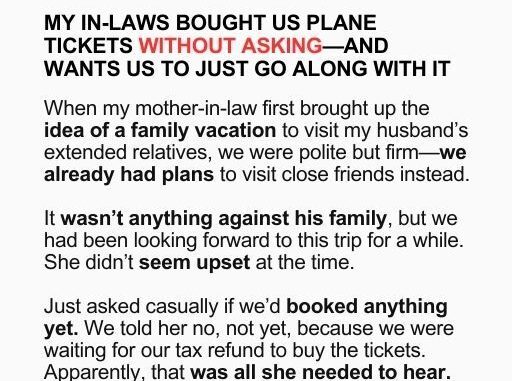
When my mother-in-law first mentioned a family trip to visit my husband’s extended relatives, we were polite but clear—we already had other plans. We had been looking forward to seeing close friends for months, and while we loved his family, this wasn’t the time. She didn’t argue. Just asked, a little too casually, if we’d bought tickets yet. We told her no—we were waiting on our tax refund.
Apparently, that was all she needed to hear.
A week later, she called, overly enthusiastic. “Great news! We bought your tickets! You’re flying out with us next month!” I blinked at the phone, sure I’d misheard. My husband, Brian, looked up from the couch. I mouthed, Did you know about this? He shook his head.
I asked, “Wait, what tickets?”
She cheerfully replied, “To Florida! We’re visiting Uncle Frank and the whole family. It’s going to be amazing!”
I was floored. Brian gently took the phone and said, “Mom, we already told you—we have other plans. We can’t go to Florida.”
Her tone shifted. “You hadn’t booked anything, so we figured this was fine. You can see your friends another time. This is family.”
That’s when it hit me—this wasn’t about a vacation. It was about control. And it wasn’t the first time, either.
Brian tried to reason with her, but she doubled down. “The tickets are non-refundable. If you don’t go, it’s just money down the drain.”
After we hung up, we sat in silence. “So what now?” I asked. Brian sighed. “We can’t keep letting her bulldoze us.”
We called her back to explain, again, that we had plans. She didn’t want to hear it. “You’re being selfish,” she snapped. “This is a rare chance to have the whole family together. Don’t be the ones to ruin it.”
Brian looked torn. “She’s not going to let this go,” he muttered later. “If we don’t go, she’ll guilt us for years.”
He wasn’t wrong. But giving in felt like telling her that this kind of manipulation was okay.
For days, things were tense. She kept texting him—how much the tickets cost, how excited everyone was, how hurt she’d be if we didn’t come. Meanwhile, I was mentally rehearsing how to break the news to our friends that our long-planned visit might be off.
Then Brian came home with a compromise. “What if we do both?” he asked.
I raised an eyebrow. “How?”
He explained: we’d go to Florida for a few days, then head straight to see our friends. It wasn’t ideal, but it would salvage part of our original plan.
We told his mom. She wasn’t thrilled—she wanted us there the whole time—but she begrudgingly accepted. “Five days minimum,” she said. “No cutting it short.”
So that’s what we did.
We flew to Florida. The weather was beautiful, and his relatives were kind. But the trip felt… strained. Like we were there because we had to be, not because we wanted to. Every moment was a reminder that we hadn’t been asked—we’d been told.
Once we got to our friends’ place, the shift was immediate. Relaxed. Joyful. Like we could finally breathe.
On the flight home, Brian took my hand. “I’m sorry,” he said. “None of this was fair to you.”
“It’s not just about me,” I replied. “We need to draw a line. Otherwise, this will keep happening.”
He nodded. And I could tell—he finally understood.
Back home, we sat down and had the hard conversation. About boundaries. About priorities. About how being family doesn’t mean you get to dictate other people’s time and choices.
That trip taught us something vital: saying no isn’t rude. It’s healthy. You can still love someone and not do everything they ask. Protecting your peace isn’t selfish—it’s necessary.
So, if you ever find yourself in a similar situation, let this be your reminder: You don’t have to go along just to keep the peace. Your plans, your time, and your boundaries matter.
If this story resonated with you, feel free to like, share, or drop your own experience in the comments. We’re not alone in this—and sometimes, just knowing that is enough to help you stand your ground.
Leave a Reply